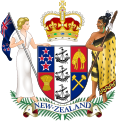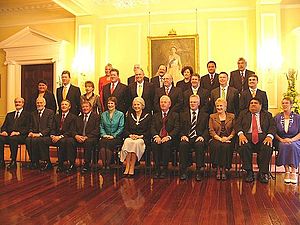- Cabinet of New Zealand
-
New Zealand 
This article is part of the series:
Politics and government of
New ZealandConstitution General
The Cabinet of New Zealand (in Māori: Te Rūnanga o te Kāwanatanga o Aotearoa) functions as the policy and decision-making body of the executive branch within the New Zealand government system. The Prime Minister and many Ministers of the Crown serve as members of the Cabinet.
All Cabinet ministers also serve as members of the Executive Council, which "advises" the Governor-General.
Contents
Legislative basis
No legislative act established the Cabinet: rather, it exists purely by constitutional convention. This convention carries sufficient weight for many official declarations and regulations to refer to the Cabinet, and a government department exists with responsibility for supporting it (the Department of the Prime Minister and Cabinet). Although Cabinet lacks any direct legislative framework for its existence, the Cabinet Manual has become the official document which governs its functions, and on which its convention rests.
The structure of Cabinet has as its basis the formal institution known as the Executive Council. Most Ministers hold membership of both bodies, but some Executive Councillors – known as "ministers outside Cabinet" – do not have Cabinet positions.
The convention of members of the Executive Council meeting separately from the Governor began during Edward Stafford's first tenure as Premier (1856–1861). Stafford, a long-time advocate of responsible government in New Zealand, believed the colonial government should have full control over all its affairs, without the intervention of the Governor. Because the Governor chaired the Executive Council, Stafford intentionally met with his ministers without the Governor present.
Powers
The lack of formal legislation establishing Cabinet leaves the powers of its members only loosely defined. However, convention regarding the Cabinet's authority has considerable force, and generally proves strong enough to bind its participants. Theoretically, each minister operates independently, having received a ministerial warrant over a certain field from the Crown (represented by the Governor-General). But the Governor-General can dismiss a minister at any time, conventionally on the advice of the Prime Minister, so ministers are largely obliged to work within a certain framework.
Cabinet itself acts as the accepted forum for establishing this framework. Ministers will jointly discuss the policy which the government as a whole will pursue, and ministers who do not exercise their respective powers in a manner compatible with Cabinet's decision risk losing those powers. This has become known as the doctrine of collective responsibility. Problems arise when the Prime Minister breaches collective responsibility. Since ministerial appointments and dismissals are in practice in the hands of the Prime Minister, the Cabinet can not directly initiate any action against a Prime Minister who openly disagrees with his government's policy. On the other hand, a Prime Minister who tries to act against concerted opposition from his Cabinet risks losing the confidence of his party colleagues. An example is former Prime Minister David Lange, who publicly spoke against a tax reform package which was sponsored by then-Finance Minister Roger Douglas and supported by Cabinet. Lange dismissed Douglas, but when the Cabinet supported Douglas against Lange, Lange himself resigned as Prime Minister.
Portfolios represented
Currently[update], significant ministers include:
- the Prime Minister
- the Deputy Prime Minister
- the Minister of Finance
- the Minister of Foreign Affairs (usually a member of Cabinet)
- the Attorney-General
Other ministers include:
- the Minister for ACC
- the Minister of Agriculture
- the Minister for Arts, Culture and Heritage
- the Minister for Biosecurity
- the Minister for Building and Construction
- the Minister for Climate Change Issues
- the Minister of Corrections
- the Minister of Defence
- the Minister for Economic Development
- the Minister of Education
- the Minister of Energy and Resources
- the Minister for the Environment
- the Minister of Foreign Affairs
- the Minister of Forestry
- the Minister of Health
- the Minister of Housing
- the Minister for Infrastructure
- the Minister of Justice
- the Minister of Railways
- the Minister of Māori Affairs
- the Minister of Police
- the Minister for Sport and Recreation
- the Minister for State Owned Enterprises
- the Minister of State Services
- the Minister of Tourism
- the Minister of Transport
- the Minister for Treaty of Waitangi Negotiations
- the Minister of Veterans' Affairs
Styles of address of members
Compare The Honourable and The Right Honourable.
Committees
 The Ministers of the Fifth Labour Government in 2005, with then Governor-General Dame Silvia Cartwright, 20 October 2005.
The Ministers of the Fifth Labour Government in 2005, with then Governor-General Dame Silvia Cartwright, 20 October 2005.
A Cabinet Committee comprises a subset of the larger Cabinet, consisting of a number of ministers who have responsibility in related areas of policy. Cabinet Committees go into considerably more detail than can be achieved at regular Cabinet meetings, discussing issues which do not need the input of ministers holding unrelated portfolios.
Cabinet Committees will often discuss matters referred to them by Cabinet itself, and then report back the results of their deliberation. This can sometimes become a powerful tool for advancing certain policies, as was demonstrated in the Lange government. Roger Douglas, Minister of Finance, and his allies succeeded in dominating the finance committee, enabling them to determine what it recommended to Cabinet. The official recommendation of the finance committee was much harder for his opponents to fight than his individual claims in Cabinet would be. Douglas was able to pass measures that, had Cabinet deliberated on them itself rather than pass them to Committee, would have been defeated.
Currently[update] eight standing Cabinet Committees exist, of varying importance:
- Policy Committee
- Economic Development Committee
- Social Development Committee
- Legislation Committee
- Government Expenditure and Administration Committee
- Appointments and Honours Committee
- External Relations and Defence Committee
- Domestic and External Security Coordination Committee
Other Cabinet Committees may emerge on a temporary basis, with the purpose of investigating an issue of relevance at the time.
Members and other ministers
The tables below list New Zealand's cabinet ministers and ministers outside Cabinet.
Cabinet ministers
Incumbent Portfolios and responsibilities John Key (National)
- Prime Minister
- Minister of Tourism
- Minister Responsible for Ministerial Services
- Minister in Charge of the NZ Security Intelligence Service
- Minister Responsible for the Government Communications Security Bureau (GCSB)
Bill English (National)
Gerry Brownlee (National)
- Minister for Economic Development
- Minister of Energy and Resources
- Leader of the House
- Associate Minister for the Rugby World Cup
- Minister for Canterbury Earthquake Recovery
Simon Power (National)
- Minister of Justice
- Minister of Commerce
- Minister Responsible for the Law Commission
- Minister of Consumer Affairs
- Associate Minister of Finance
- Deputy Leader of the House
Tony Ryall (National)
- Minister of Health
- Minister for State-Owned Enterprises
- Minister of State Services
Dr Nick Smith (National)
- Minister for the Environment
- Minister Responsible for Climate Change Issues
- Minister for ACC
Judith Collins (National)
- Minister of Police
- Minister of Corrections
- Minister of Veterans' Affairs
Anne Tolley (National)
- Minister of Education
- Minister Responsible for the Education Review Office
Chris Finlayson (National)
- Attorney General (Includes responsibility for the Serious Fraud Office)
- Minister in Charge of Treaty of Waitangi Negotiations
- Minister for Arts, Culture and Heritage
David Carter (National)
- Minister of Agriculture
- Minister for Biosecurity
- Minister of Forestry
Murray McCully (National)
- Minister of Foreign Affairs
- Minister for Sport and Recreation
- Minister for the Rugby World Cup
Tim Groser (National)
- Minister of Trade
- Associate Minister of Foreign Affairs
- Minister Responsible for International Climate Change Negotiations
Dr Wayne Mapp (National)
- Minister of Defence
- Minister of Science and Innovation
- Associate Minister for Economic Development
- Associate Minister for Tertiary Education
Steven Joyce (National)
- Minister of Transport
- Minister for Tertiary Education
- Minister for Communications and Information Technology
- Associate Minister of Finance
- Associate Minister for Infrastructure
Georgina Te Heuheu (National)
- Minister for Courts
- Minister of Pacific Island Affairs
- Minister for Disarmament and Arms Control
- Associate Minister of Māori Affairs
- Associate Minister for ACC
- Associate Minister of Energy and Resources
Paula Bennett (National)
- Minister for Social Development and Employment
- Minister of Youth Affairs
Phil Heatley (National)
- Minister of Fisheries
- Minister of Housing
Dr Jonathan Coleman (National)
- Minister of Immigration
- Minister of Broadcasting
- Associate Minister of Tourism
- Associate Minister of Health
Kate Wilkinson (National)
- Minister of Labour
- Minister for Food Safety
- Minister of Conservation
- Associate Minister of Immigration
Hekia Parata, Lady Gardiner ( National)
- Minister of Ethnic Affairs
- Minister of Women's Affairs
- Associate and Acting Minister for Energy and Resources
Ministers outside Cabinet
Incumbent Portfolios and responsibilities Maurice Williamson (National)
- Minister of Customs
- Minister for Building and Construction
- Minister of Statistics
- Minister for Small Business
- Minister for Land Information
Nathan Guy (National)
- Minister of Internal Affairs
- Minister Responsible for Archives NZ
- Minister Responsible for the National Library
- Associate Minister of Justice
- Associate Minister of Transport
Craig Foss (National)
- Minister of Civil Defence
- Minister for Senior Citizens
- Minister for Racing
- Associate Minister of Local Government
Ministers outside Cabinet from other parties with confidence and supply agreements
Incumbent Portfolios and responsibilities Rodney Hide (ACT)
- Minister of Local Government
- Minister for Regulatory Reform
- Associate Minister of Education
Dr Pita Sharples - Minister of Māori Affairs
- Associate Minister of Corrections
- Associate Minister of Education
Tariana Turia - Minister for the Community and Voluntary Sector
- Minister for Disability Issues
- Associate Minister of Health
- Associate Minister for Social Development and Employment
Peter Dunne - Minister of Revenue
- Associate Minister of Health
National cabinets of Oceania Sovereign states - Australia
- East Timor (Timor-Leste)
- Fiji
- Indonesia
- Kiribati
- Marshall Islands
- Federated States of Micronesia
- Nauru
- New Zealand
- Palau
- Papua New Guinea
- Samoa
- Solomon Islands
- Tonga
- Tuvalu
- Vanuatu
Dependencies and
other territories- American Samoa
- Christmas Island
- Cocos (Keeling) Islands
- Cook Islands
- Easter Island
- French Polynesia
- Guam
- Hawaii
- New Caledonia
- Niue
- Norfolk Island
- Northern Mariana Islands
- Pitcairn Islands
- Tokelau
- Wallis and Futuna
Categories:- Politics of New Zealand
- Constitution of New Zealand
- National cabinets
- Members of the Cabinet of New Zealand
Wikimedia Foundation. 2010.


